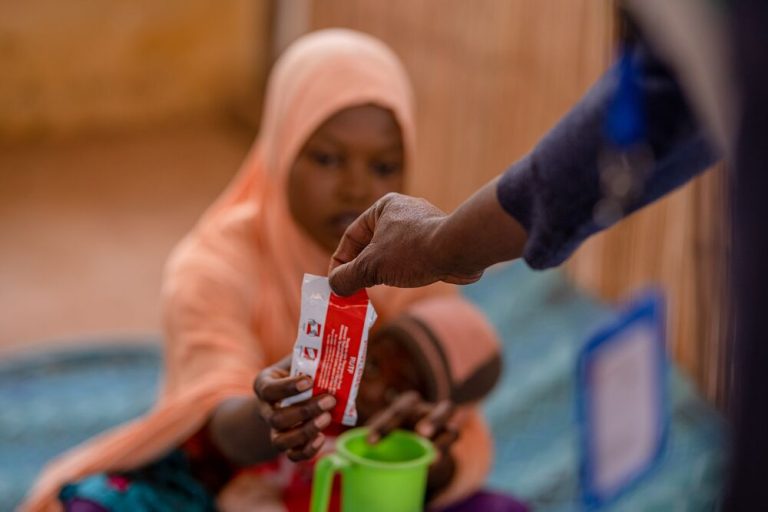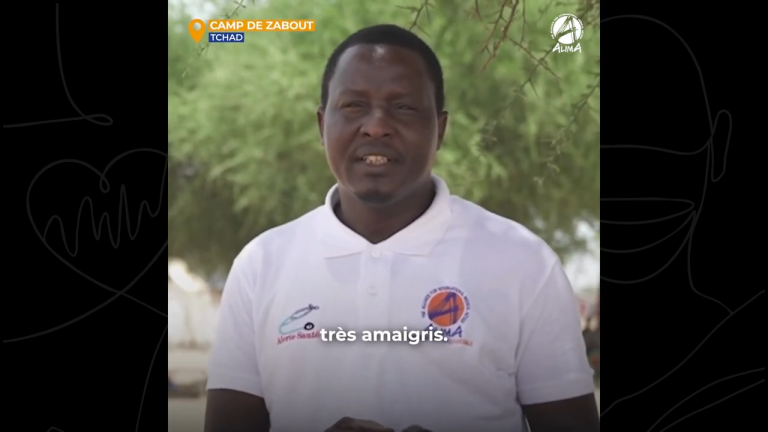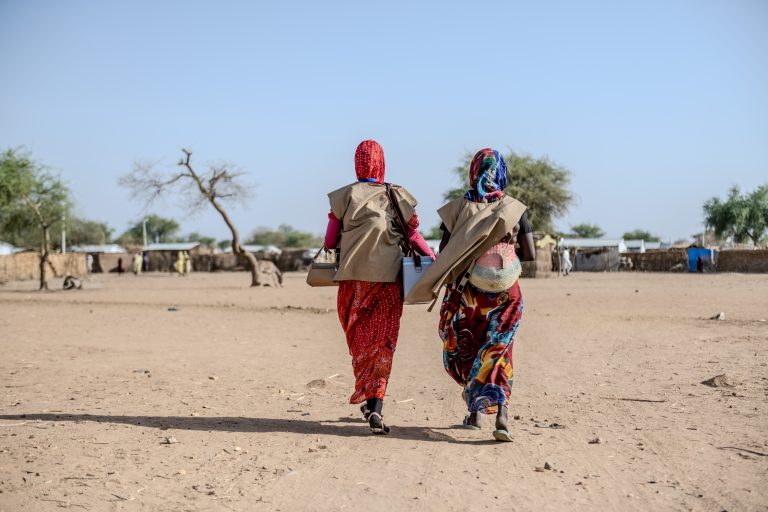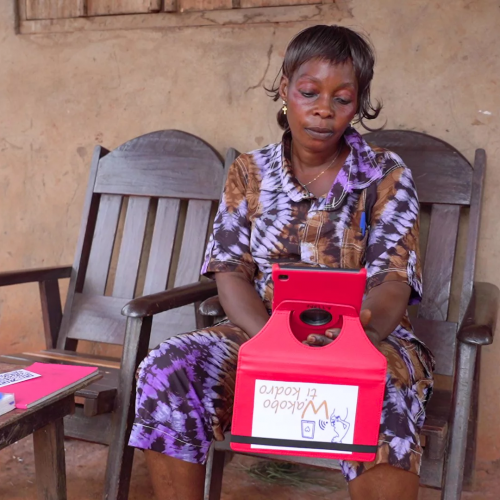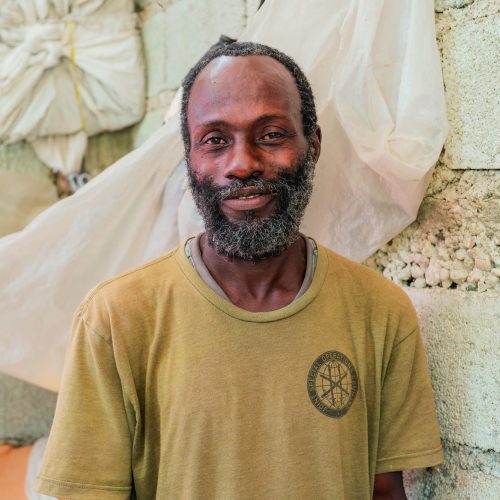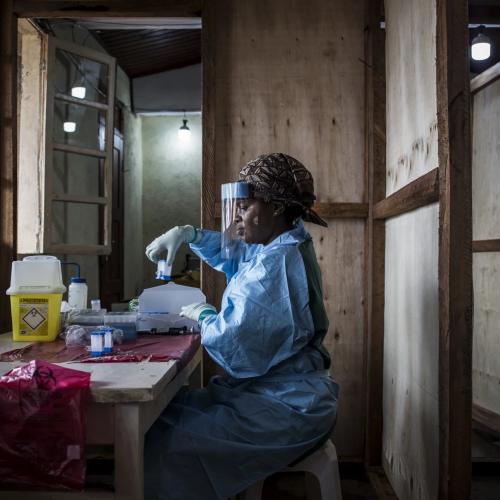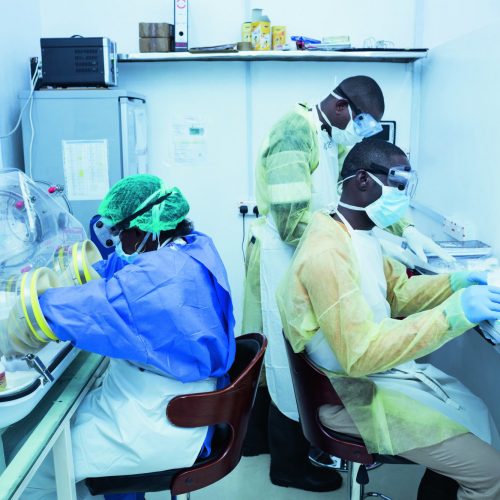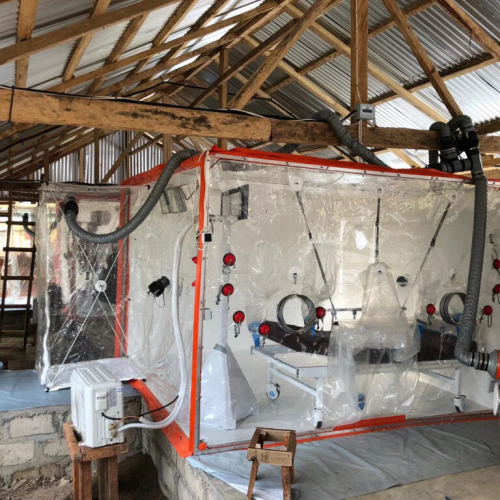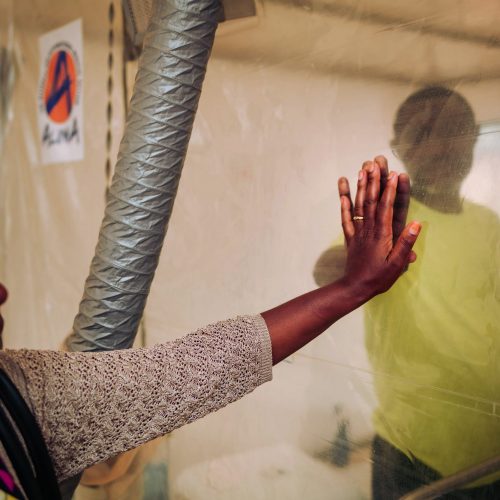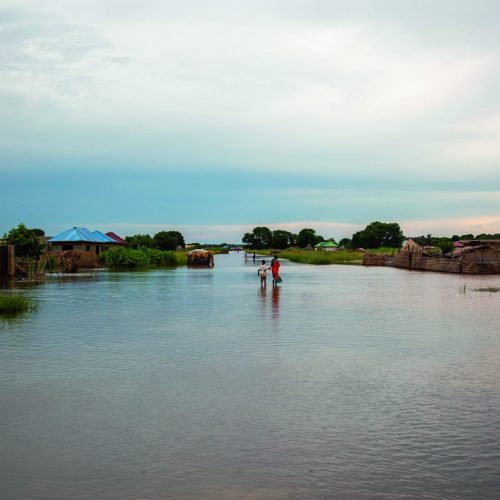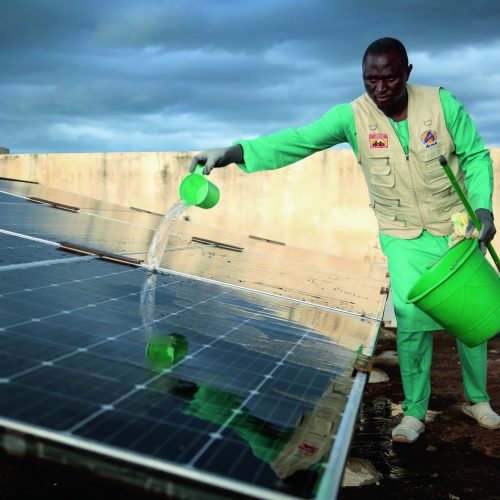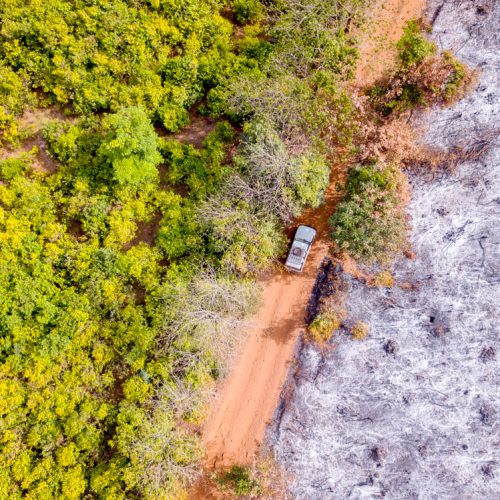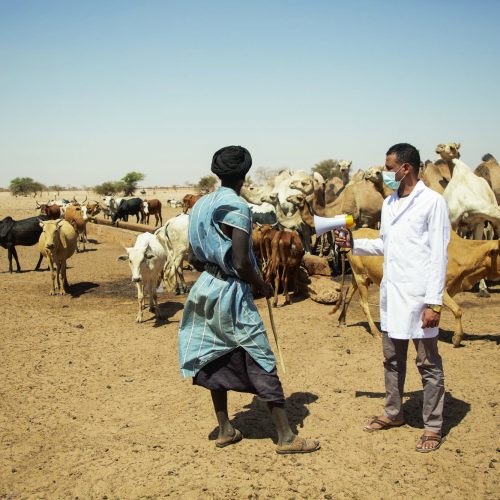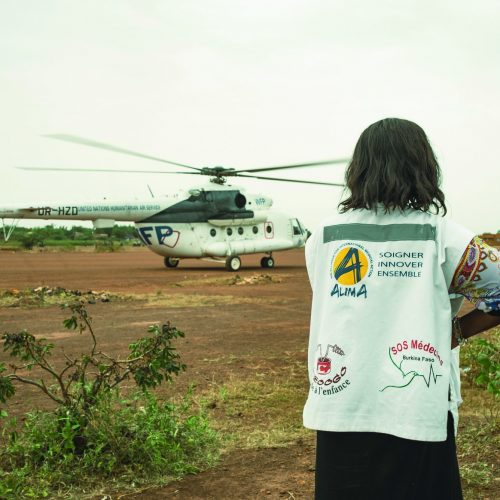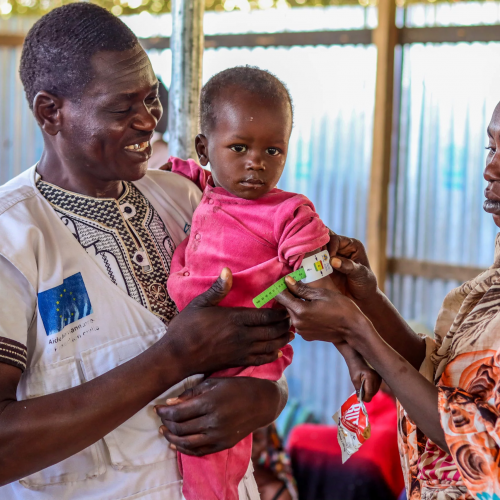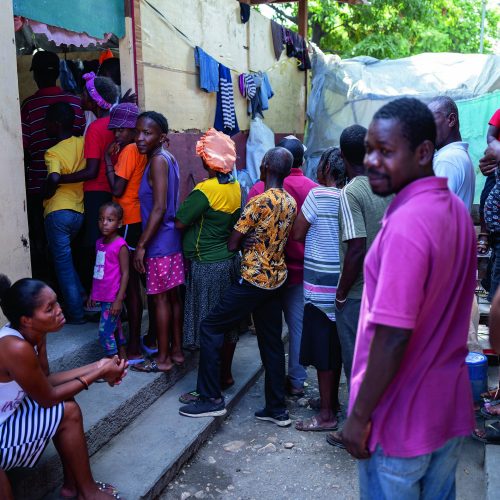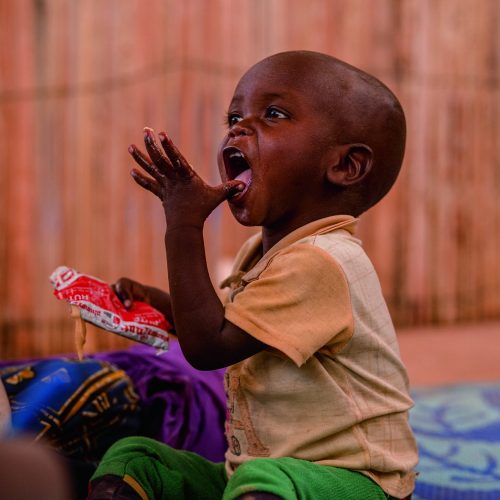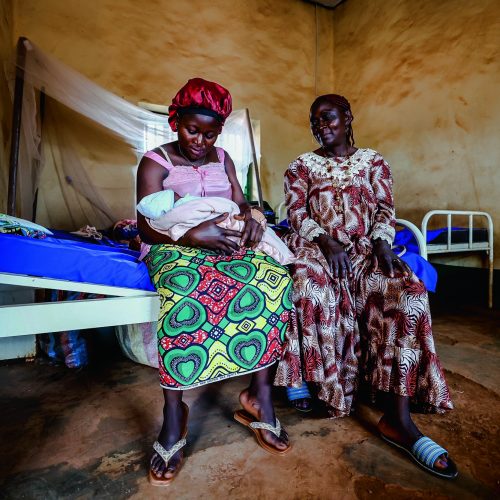In one of the two tents set up at the entrance of the COVID-19 treatment center in Donka, patients and health promoters are deep in conversation. A flashing red light causes them to raise their heads: an ambulance has pulled up. In a few moments, several people have surrounded the vehicle to take care of the patient it is carrying. A man approaches and talks with the driver. It is Kalidou Conté, ALIMA’s ambulance manager.
Kalidou Conté is the ambulance manager for ALIMA at the COVID-19 treatment center in Donka. Conakry.
“I coordinate the transport of patients.” – Kalidou
“My job is important because I coordinate the transport of patients from other health facilities to Donka. The doctors in the triage service, the point of contact with the other COVID-19 treatment centers in the Conakry region, inform me that there is a patient in a critical condition to be picked up at another facility and I immediately send an ambulance driver with a nurse or doctor.”
Health workers enter the building with the patient. After passing the reception desk, we follow them into a corridor, where we pass a series of office doors. In front of one of them, we see Dr. Hadjiratou Bah, medical supervisor for ALIMA. She coordinates and supervises the medical activities and schedules of the staff, including more than 200 doctors, during the peak of the COVID-19 emergency.
Dr. Hadjiratou Bah is the medical supervisor for ALIMA in the COVID-19 treatment center in Donka. Conakry.
“The motivation and commitment of my teams allow me to improve myself every day.” – Dr. Hadjiratou
“As a medical supervisor, I also act as a liaison between the treatment center and external specialists when examinations in external structures are necessary [for example: scans, ultrasounds, blood tests, etc.]. This requires knowing how to manage a multitude of profiles: generalists, specialists, experienced people, young graduates…With dedication and effort, I have managed to gain the trust of everyone. The motivation and commitment of my teams allow me to improve myself every day. The confidence shown by the teams and the number of patients that have been healed are a source of pride for me.”
A little further on, from the doctors’ and nurses’ office in the intensive care unit, bits of conversation slip out of the room, as someone prepares to enter the red zone, where patients with the virus are being cared for. Dr. Pétronile Agbodossindji, an intensive care specialist, is just about to get dressed in protective gear. She takes some time to talk to us about the use of oxygen.
Dr. Pétronile Agbodossindji is an intensive care specialist for ALIMA at the COVID-19 treatment center in Donka.
“Having oxygen supplies is essential.” – Dr. Pétronile
“COVID-19 is a disease that can cause damage to the lungs, which reduces a patients’ oxygen saturation, so they need to be given oxygen. If a patient in critical condition comes into our intensive care unit and we don’t have oxygen, there is no chance of survival. Having oxygen supplies is essential.
At the COVID treatment center in Donka, since ALIMA began providing oxygen concentrators, which filter oxygen from the ambient air and deliver it in concentrated form to the patients, the consumption of bottled oxygen has been greatly reduced. This helps us a lot because oxygen cylinders are expensive and difficult to transport. Now we are putting patients on concentrators and no longer worry about oxygen supply disruptions.”
Dr. Pétronile will now enter the “red zone” to care for her patients. She is equipped from head to toe in protective gear: a medical bonnet, face shield, medical blouse, smock, gloves and boots, to avoid any possible contamination. Like her, we equip ourselves to enter. In a staircase, we follow a nurse. She holds a small cooler in her hand. She is Salimatou Diallo, a nurse who works in the laboratory at the COVID-19 treatment center. This morning, she must take samples from nearly 30 patients, as part of COVID control testing, in order to confirm whether or not a previously infected patient has since tested negative for the virus and can be discharged from the treatment center.
Salimatou Diallo is a nurse for ALIMA in the COVID-19 center in Donka.
“My role is also to inform patients.” – Salimatou
“Every morning at 8 a.m., I report to the lab. I consult the list of patients to be sampled: the number of nasopharyngeal swabs, blood samples…there are sometimes more than 30 patients to see in the morning! We check the lists then prepare the materials and label the tubes in which the samples will be stored.
At about 10 o’clock, I put on my protective gear and I enter the red zone. I go to each patients’ rooms to take their samples and I store their samples in a cooler. Some patients are happy to see me because they know that if their test is negative, they will be able to leave. Others are afraid because the test can be unpleasant and painful. My role is also to inform patients, to explain how the test is done and when they will get their results. I really appreciate these interactions.”
We let Salimatou continue her work; she must not waste any time. By 11:30 a.m., the nurse must complete the tests so that the nasal samples can be sent, by noon at the latest, to the national laboratory responsible for COVID analyses. In the second-floor hallway, several patients are sitting in a row on spaced chairs. From there, they have a panoramic view of the hospital’s large courtyard where visitors and vehicles line up. You can also see the entrance to the laundry rooms. We decide to go there. Inside, we meet Louty Pierre Kpamy, an ALIMA hygienist
Louty Pierre Kpamy is a hygienist for ALIMA in the COVID-19 treatment center in Donka.
“Previously, I was a math teacher at a private school.” – Louty
“I have been a hygienist for ALIMA since the center opened in April 2020. Previously, I was a math teacher at a private school. When the facility closed because of COVID-19, I wanted to make myself useful and help the population.
When I arrived at the center on the first day, I admit I was scared. But seeing the strict Infection Prevention and Control measures in place, the mandatory wearing of surgical masks and the use of chlorine to disinfect everything, I realized that there was no reason to be afraid. It is my job to make sure that everything is always clean and disinfected.
Of course, the work is physical and exhausting. For the first two weeks, for example, before the washing machines were received, all the staff’s equipment had to be washed by hand. It was hard, but I fought with my body and soul. I didn’t give up.
If I had to send a message to the Guinean youth, it would be: ‘Don’t stand idly by! We can all contribute to the fight against the virus.’ I am not a doctor and yet I can take part in the battle, in my own way.”
The sound of laundry thumping in the machine has just stopped; Louty Pierre is already heading towards the machine to unload the clothes. The laundry room is located right next to the ‘red zone’ exit. This is where the health workers come out and remove their protective equipment. It is also here that the recovered patients leave, before a final step: the exit interview. Mariama Djego Bah, a health promoter, is the last link in the great chain of agents on whom hospitalized patients rely.
Mariama Djego Bah is a health promoter for ALIMA at the COVID-19 treatment center in Donka. To her left is Lolamou Nema, also a health promoter. © SYDPRODUCTION / ALIMA
Mariama: “The most rewarding thing for me…is to see patients happy.”
“We are the liaison between the medical teams and the patients. We talk with patients at the entrance and explain how the center works. When they have questions or concerns, we come to their bedside to answer them as best we can. We also organize visits by relatives. And when they leave the center, we do a discharge interview and then give them their recovery certificate.
Most of them thanks us for the welcome, the care, the availability of the staff and the work of the hygienists. The most rewarding thing for me is to be able to help these patients, cheer them up and to see them happy at the end of their stay. That motivates me a lot.”
A poster from a patient thanking the staff, prominently displayed on a staircase at the COVID-19 treatment center in Donka. © Anne-Gaëlle Borg / ALIMA
———————————————————-
Since April 6, 2020, ALIMA has been supporting the National Health Security Agency of Guinea in the care of patients with COVID-19 at the Donka COVID-19 treatment center in Conakry.
ALIMA’s activities at the COVID-19 treatment center in Donka are financed by the European Union.
The contents of this publication are the sole responsibility of ALIMA and do not necessarily reflect the views of the European Union.
Cover photo: © Anne-Gaëlle Borg / ALIMA

